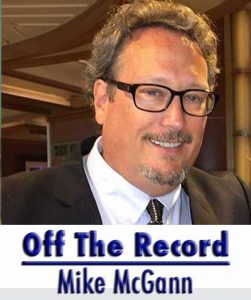As poorer districts struggle, they are everyone’s future without state action
By Mike McGann, Editor, The Times
 If you’ve been in and around Coatesville recently, you may have seen picketing teachers — as was the case at the district’s three middle schools Thursday night. The contract between the district and the Coatesville Area Teachers Association expired in late August and there has been little movement on a new contract.
If you’ve been in and around Coatesville recently, you may have seen picketing teachers — as was the case at the district’s three middle schools Thursday night. The contract between the district and the Coatesville Area Teachers Association expired in late August and there has been little movement on a new contract.
And the teachers are frustrated that Superintendent of Schools Cathy Taschner was given a new five-year contract, but they can’t seem to get any traction on a new deal with pay hikes anywhere near the cost of living increases. They feel, understandably, unappreciated.
But here’s the problem: where is the money for pay raises going to come from? Between diminishing property values and the hard wall that is Act I of 2006 (the law that limits how much property tax can increase) there isn’t enough money to properly pay the teachers. If you support the teachers — and in general most folks do — what programs do you cut to pay to boost salaries, benefits and the pension hit?
Not to mention the increasing expense and impact of special education costs, millions of dollars of state and federally mandated spending without much in the way of funding. Add in the fact that charter schools cherry pick the least impaired special education students, then send the district the bill for the full boat cost (nice to have the taxpayers as profit center, right?), making the finances even worse.

Coatesville Area School District teachers picket Thursday night at South Brandywine Middle School to protest working without a contract.
That’s the reality — the teachers absolutely deserve decent raises, but the school board and the administration are hamstrung by the state and fiscal realities of the district.
And there are those who want to stoke the battle between the teachers and the administration — spreading false rumors, from suggesting all of the bathrooms but one at South Brandywine Middle School were closed (the truth was one of six was closed for repairs), that pre-AP courses at the middle schools were being taught without accreditation (the district has been working with the College Board directly all year on these courses, we’ve seen the materials and training schedule) and so on. They’re lies, of course, but angry, frustrated people buy into them anyway.
You have to wonder about the rumor mongers and who owns them. Is it charter school proponents, looking to wreck public schools and turn free public education into the kind of debt-incurring profit center that college has become? Is it certain elected officials — who get gobs of campaign contributions from charter school companies — who want to argue, “see, public schools are a failure. We have to privatize.”
Or maybe other elected officials who refuse to fight for school funding, because as we all know state tax money should only be used to subsidize large, for-profit corporations (like say, West Chester’s QVC, which pockets big state subsidy checks and then lays off local workers), not our children, but want to make sure the finger of blame gets pointed elsewhere.
Whatever the motivation — cash probably — the district has enough real issues that people need to look closely at such charges and see if they’re really true before running off to social media and offering angry protests.
Stoking the fight between teachers and the school board/administration keeps folks from figuring out where the real issue lies, doesn’t it? And it’s not like it hasn’t happened in other, wealthier districts in Chester County.
And if you live in one of those wealthier districts, don’t get too smug. The fiscal mess that is Coatesville and Octorara and other districts in Southeast Pennsylvania is nothing more than the canary in the coal mine. Your high achieving schools that you love to brag about — and see a nice benefit from in terms of real estate values — are headed into the same mess within a decade. Obviously, some will fare better than others, but no district will be immune.
Like the horrific pension vote of 2001, Act I of 2006 was a deal with the devil, oddly appropriate as former Gov. Ed Rendell was in the middle of it. If Rendell had actually had a soul, he would have sold it to get something that seemed like “property tax reform” — at least in the press release — and thus Act I was born.
Instead of finding a way to restore state funding to its level of about 50% (it’s about 31% right now) as it was in the early 1980s, Rendell and the legislature slapped a cap on how much school districts could raise taxes, based on a three-year window of cost of living data. Unless districts gamed the system and stashed cash against a rainy day, the fiscal base of school districts have been slowly been eroded and will continue to do so.
Now, in fairness, Coatesville’s schools have been exceptionally poorly managed for the better part of two decades, with looting going on from board members and politically-connected types — with everything from ill-advised real estate purchases to hiring friends and family to paying outrageous professional fees.
Were it not for Act I, the pension mess and ridiculously poor state funding Coatesville might have an even shot at righting the ship and putting the district back on its feet. Already — whether you like Taschner or not — some progress has been made in the last two years, despite hurricane-force headwinds, which is why her new contract doesn’t seem unreasonable.
Without a real fix from the state — on everything from fair funding to charter schools — there’s only so much that can be done, though.
That’s why this year’s sate legislative elections matter — ask your candidates what they plan to do and pin them down on details — dollar amounts for your school district and dollar impacts on your property tax. We’ve seen too much spin and deflection over the last couple of decades and you have every right to demand real answers.
Still, it’s not the whole answer. School districts and their communities must work to come together — teachers, parents, administrators and taxpayers. On a number of issues these groups have common cause; if they were to stand together would have great power to reshape our communities in a positive way.
Division — and the lies that create it – makes us weaker. Unity, open communication and shared purpose make us stronger. You have the power. Do something with it.






